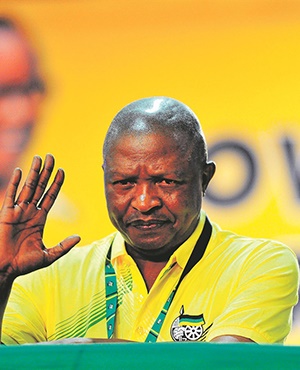Are South Africans in denial about the implications of Deputy President David Mabuza for President Cyril Ramaphosa's efforts to end corruption?
An article by the New York Times published on Saturday blasts the deputy president for being the single biggest undermining factor to Ramaphosa's "new dawn".
The article details Mabuza's rise to power and claims that he "built his political career on the schools", using state money meant for education and upliftment in Mpumalanga to "buy loyalty and amass enormous power, making him impossible to ignore on the national stage and putting him in position to shape South Africa for years to come".
The authors question Ramaphosa's choice of Mabuza as deputy as an "odd choice" in light of his promise to curb corruption.
Political analyst Melanie Verwoerd says it's generally known that Mabuza was a compromise candidate for Ramaphosa and there's no doubt that a lot of questions remain unanswered domestically and internationally about the deputy president's past in Mpumalanga.
In the New York Times' 3 000-word feature article, the publication explores whether the ANC's leaders are part of the problem of large scale corruption, and Mabuza’s role in the collapse of Mpumalanga's education system.
It details how Mabuza used the province's education budget to allegedly funnel money to his own pockets, and used it to build a large following in the ANC, which ultimately gave him kingmaker's status at the party's elective conference in Nasrec in December 2017.
"His province routinely spent less on poor students than required, and school construction projects have been riddled with inflated costs, government records show," the authors write.
"Nearly a quarter of the primary schools in Mr Mabuza’s province still have only dilapidated pit toilets, despite ample government funds to fix them. And during his tenure, his province was caught fabricating the passing rates on the annual national exam, enabling him to claim big leaps forward that never happened."
'You just can't rehabilitate him'
This has led to a situation "where millions of dollars for education have disappeared into a vortex of suspicious spending, shoddy public construction and brazen corruption to fuel his political ambitions, according to government records and officials in his party".
Mpumalanga has also become known as one of South Africa's most dangerous provinces, with close to 20 ANC politicians having been assassinated since 1994, some after blowing the whistle on corruption in the province.
So, are we naïve to expect action on corruption from Ramphosa if his No.2 is this compromised?
"I think the president's intention to deal with corruption is real and sincere," says Verwoerd. "However, the scale to which it escalated during the Zuma years makes it a massive undertaking from the outset. What makes his task even more difficult is that he constantly has to watch his back in the ANC because those people involved in corruption are obviously against it."
This has been the big question ever since speculation started that Mabuza was gunning for the position of deputy president of the ANC and the country.
Analysts agreed before the election that he would be a liability to whichever presidential candidate he went with.
"Even if he brings large numbers of support, he remains a liability because you can't deny his association with corruption," said Ralph Mathekga, a political analyst.
"Someone like Cyril Ramaphosa can't run an anti-corruption campaign while sitting next to David Mabuza. You just can't rehabilitate him."
